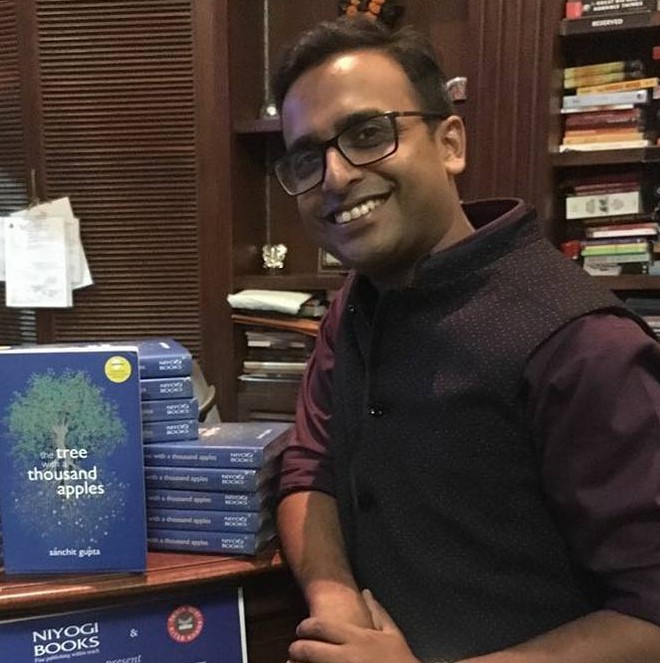Interview with Sanchit Gupta, author of "The Tree with a Thousand Apples"
on Feb 22, 2022

Born and brought up in the hills of Himachal Pradesh, Sanchit began his career as a part-time copywriter. He went on to co-found his own theater group, worked as a freelance film screenwriter and as executive producer–fiction for a leading television network. His short stories have been published in several publications and lit festivals, viz Muse India, Indian Ruminations, Contemporary Literary Review India and Tata Lit Live to name a few. He has worked with All India Radio as a talk show host.
1. The tragedy that happened in 1990 is still prevalent in Kashmir, can you give your perspective on how it left a deep impact on everyone that suffered from it?
Yep. So, you know, as also the book which is called “The Tree with a Thousand Apples” tries to say, the impact that kind of came in 1990 was even on the soul of Kashmir, and it impacted the Kashmiri pandits who had to leave their houses overnight, it impacted the Kashmiri Muslims who became prisoners in their own city. It impacted the people you know, the army that had to go there and fight against an unknown enemy, it impacted the whole fabric of the place and the culture. And hence, when we look at the future also, we need to understand that it is something that we need to ensure an address that is a cause that affects all the communities together and not just one and work towards that, you know, that is what we should understand. Whenever we look at Kashmir.
2. So political or religious, how do you look at 1990?
Neither, it is social, you know, we are the ones who will add politics or religion to it. But eventually it is not the politicians, it is not the fear, or the religious leaders who suffer. They are the common people of the society, who end up suffering from both sides, from all the stakeholders who really do suffer, who are innocents, who are used by others in their own cause. And hence it's a social issue. It's a social problem. It's a social impact. It is neither political nor religious. And that is what we must keep in mind.
3. How do you relate your fictional story of three friends with the true events that happened in Kashmir?
Well, I think, that’s a quiet kind of rhetorical question in the sense that the book follows the true events. So based on these incidents that happened during the 90s, be it the insurgency of 1989, 90. So the book is built on true events. It is a fictional story. The characters are fictional, but the events that are happening were real.
4. So what impact did the tragedy bring in the lives of the people who were born after it?
Even if you are born after it, or born before it, you kind of follow the lineage of what has happened.
6. "If a criminal was once a saint & a saint was once a criminal, then who is the criminal and who is the saint?" Maybe everyone has a saint and a criminal in themselves. Do you agree?
absolutely and it is just the circumstances that kind of take one person into that direction and hence we should understand and empathize with where the person is coming from. Be it the saint or a criminal.
7. The most affected victims in the 1989 tragedy were the citizens who witnessed everything. So did you write this book to show the pain from their perspective?
It is one of the perspectives Yes, you know, as I always say the one line of the book is about an innocent civil liberal searching for justice and exiled pandits who longed for belongingness and a cold hearted rebel who started redemption and there are all three different perspectives you know, and they're all suffered in their own different ways. And that is what we need to understand and appreciate that it is not a suffering of one person or one community it is, you know, suffering of all of them and of Kashmir as a whole.

.jpg)
.jpg)
.jpg)
.jpg)
.jpg)
.jpg)

.jpg)
.jpg)
.jpg)
.jpg)


_(1).jpg)
.jpg)










Sorry! No comment found for this post.